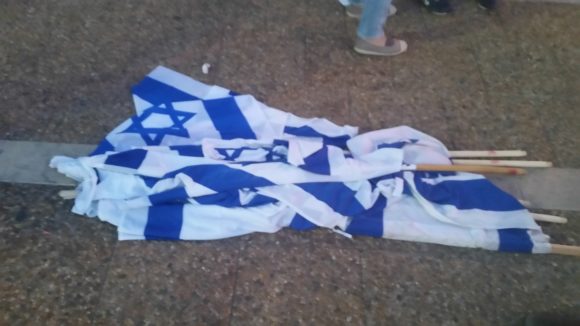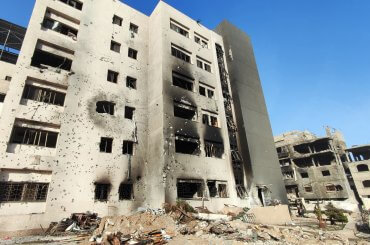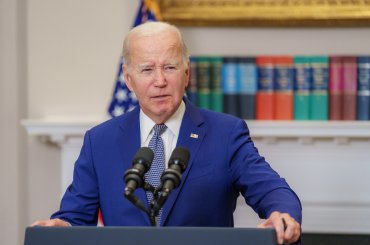Fifty-one years ago this week, I was scheduled to go to Israel with about 100 kids from Camp Ramah locations all over the US. Instead, the 6 Day War took place. Known to Palestinians since then as the Naksa—”day of the setback”—it represents the further displacement of Palestinians that resulted from Israel’s victory in the 1967 War. When the war was over, the Jewish Theological Seminary, sponsor of Ramah’s Hebrew-speaking sleep away summer camps throughout the U.S. and the Ramah seminar to Israel, contacted our parents and rescheduled the trip for a few weeks later.
Fifty years later, in November 2017, about 30 of us gathered for a reunion in a Manhattan apartment. Another thirty or so had reunited in Israel a few weeks earlier. I tried to write about it six months ago. Now, finally, inspired by the steadfastness of the Great Return March in Gaza, I am moved to reflect publicly about my experience.
In 1967, we were about 100 fifteen- to seventeen year-olds between our junior and senior years of high school, ready for the adventure of visiting Israel, most of us for the first time. Some of us, like me, came from observant, Shomer Shabbes families. Some were not religiously observant at all; some were something in between. I guess we were all Zionists. I don’t remember calling myself a Zionist, it was just assumed to be true; there was no other way of looking at Israel.
Many of the folks I went to Israel with—likely most—have maintained a strong Zionist perspective for the last fifty-one years, support for Israel remaining an important focus of their lives. They may see some problems that should be fixed, but they don’t recognize Israel as a settler colony. They refuse to see the inhumanity (and illegality) of collective punishment of entire families, even entire neighborhoods, in response to Palestinian attacks on Israel, which were themselves in response to the day-to-day demolition of their lives.
In my own life, I’ve gone off in a different direction, one that has lost me friends and family relations but gained me new friends and opened new vistas. As I met people whose homes had been demolished, and studied the history since Zionism’s founding in the 1890’s, I saw that the Israeli dream had always been destined to become a nightmare to those conquered by it.
In the emails leading up to our get-together, there was no mention of the developments in Israel since 1967. Perhaps no one dared open that can of worms. But it did get opened, as each of us took three minutes to talk about then and now.
At the reunion, we looked at pictures taken during our trip. When I first saw the photos of the empty hilltops in the West Bank—“liberated” by the IDF in 1967—I felt sick to my stomach. Those hilltops and many more are now occupied by Jewish citizens of Israel, with tax benefits from their government—whether Labor or Likud—for moving to those settlements, all illegal under international law. The Fourth Geneva Convention of 1949 prohibits countries from moving their population into territories occupied in a war; fifty-one years after the ’67 war, there are more than 600,000 Jews living in the occupied West Bank, Golan Heights and East Jerusalem.
When it was my turn to speak, I talked about my anger at these moral and ethical violations, and then mentioned the email I had received that morning. If Not Now members had protested outside the Jewish Theological Seminary. As they return to Ramah this summer as camp counselors, they are committed to teaching about the occupation and Palestinian narratives to other staff and to their campers. (Their hashtag: #YouNeverToldMe.) Perhaps for the first time, this will be an opportunity for many to listen to the other side. “The Occupation,” they write, “is a daily nightmare for Palestinian people and a moral disaster for the Jewish people. Our generation cannot sit by while the institutions we care for absolve themselves of their responsibility to ensure a just future for Israelis and Palestinians by depicting a one-sided narrative or explaining the situation to students as ‘complicated.’”
What if, when we went to Israel in the summer of 1967, we had met the Palestinians who were thrown out of their homes a few weeks earlier? What if we had met Palestinians living in the West Bank since 1948, when they were first driven out—victims of Israel’s triumph—into the West Bank and Gaza, with no recourse? What if we had seen them as human beings—disempowered human beings, as we ourselves have been in the past—and learned their stories?
What if we had been taught to recognize the influence of both the Holocaust, which the Palestinians bear no responsibility for, and the Nakba, which Israel is responsible for? For the Palestinians, it was the displacement of 750,000 people that preceded and followed the Israeli Declaration of Independence in 1948. How would we be different now? And considering how each of us is connected to hundreds of others, how would the situation in the Jewish community be different? Could a group of 16-year-olds returning from Israel and denouncing injustice have affected the Jewish community’s denial of the ethnic cleansing being perpetrated in their name?
While I’m not sure, it felt safe to assume that few, if any, of the folks at the reunion voted for Trump or agree with his regime’s policies with regard to immigration, a Muslim ban, the environment, systemic racism, Nazis and white supremacists, guns, women’s reproductive rights, sexual assault, homophobia, or transphobia.
I believe my fellow Ramah-niks oppose racism and injustice in our country. If they do, why won’t they see the racism of Israeli society? Why don’t they see the theft of land, uprooting of olive trees, detention of children, and the alliance with despots throughout the world? Why do they continue to conflate Judaism with Zionism? Don’t they see that Zionism redefines Jews as oppressors?
Why aren’t they speaking out against the murder of 120 Palestinians in Gaza since March 30, including children and journalists and medical workers? How can they possibly defend such violence against people standing up for their rights? I hope they will soon come to see the Israelis’ refusal to recognize the humanity of the Palestinians—struggling, in their despair, to get the world to see the horror of the situation they face every day.
How do we pursue tikkun olam (fixing the world)? How can we begin to do that if we murder people who are living on the land we wish to claim, ethnically cleansing them so that we may have it for ourselves? We can only fix the world if we stand for justice for all people, even and especially when it requires us to question our own history, upbringing, traditions, and decisions.



Thank you for your story Menucha Sara. i really want to know how they reacted after your 3 minute speech and wonder if there was any discussion afterwards or if the conversation just moved right on to the next person. and how very interesting you had a camp reunion after all these years. i seriously doubt if i could ever find a list of the people i went to camp with when i was a teen.
yes, for the most part, your generation of jewish americans are extremely attached to israel. it could very well be the last generation of it’s kind with such an attachment.
Great article – thank you for so precisely asking the questions that Zionists dare not answer.
Btw, I have been standing up ever since.
I’m sure others have and do.
These programs took thousands of kids to Israel.
MENUCHA SARA….- “Why do they continue to conflate Judaism with Zionism?”
Perhaps it is because American Judaism and American Zionism have merged to become a new phase of Judaism? A couple of quotes from Zionist theologian Jacob Neusner, followed by a concluding comment.
“Just as the Judaic tradition had formerly told Jews what it meant to be Jewish – had supplied them with a considerable definition of their identity – so does Zionism in the modern age. Jews who lost hold of the mythic structure of the past were given a grasp on a new myth, one composed of the structural remnants of the old one.” (p176, “Stranger at Home: “The Holocaust”, Zionism, and American Judaism,” Jacob Neusner)
“Zionism provides a reconstruction of Jewish identity, for it reaffirms the nationhood of Israel in the face of the disintegration of the religious bases of Jewish peoplehood.” (p196, Neusner)
“…in fact the redemptive valence imputed to the State of Israel in American Judaism constitutes a judgment of Zionism. American Judaism must be deemed a wholly Zionist Judaism.” (p8, Neusner)
All of this confirms my contention that the success of Zionism in becoming an integral expression of American Judaic thought and action indicates that American Judaism (Reform, Conservative, and Orthodox) can now be described as Judeo-Zionism, non-Zionist Judaism outside the mainstream.
Beautiful–thank you for writing this.